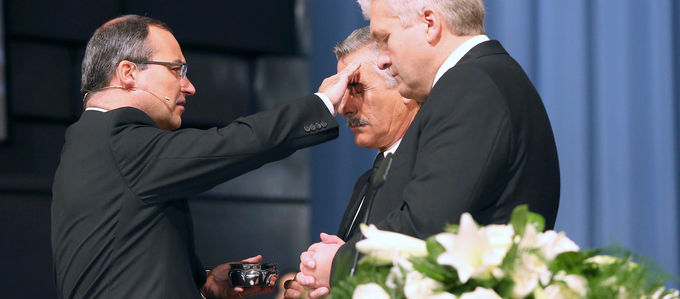
Let’s suppose a Priest proves unworthy and loses his ministry: are the baptisms he has performed still valid? The question of the efficacy of the sacraments has different answers.
Ex opere operator is the principle of the Catholic Church. According to this, the sacraments act “by virtue of the work performed”. With regard to the authoritative dispenser, it needs nothing more than the intention to put into effect what the Church recognises to be the will of God.
This notion emerged in the Late Middle Ages, and it was one of the few innovations since Augustine of Hippo, one of the Latin Fathers of the Church, had developed the doctrine of the sacraments some five hundred years earlier. However, it was not to be elevated to the status of an official dogma until 1547—evolving out of the dispute with the reformers.
Against automatism
Sola fide was the rallying cry with which Martin Luther and his fellow campaigners opposed the Catholic formula. They lived in an era when religious acts of mercy could be purchased through the sale of indulgences. And they experienced the celebration of Holy Communion in such a way that the words of consecration hoc est corpus meum became the proverbial “hocus pocus”.
The reformers had serious problems with the idea that the proper act automatically produces salvation. “It is not the sacrament that justifies, but faith in the sacrament,” Luther railed, against this “godless and pernicious notion”. It is the faith of the one who receives the sacrament that allows the sacrament to have an effect.
Where man comes into the equation
Today, some five hundred years later, theologians know that the notions at the time were not so far apart.
From the Protestant point of view too, the efficacy of a sacrament does not depend on the worthiness of the minister dispensing it. “For it is not based on human holiness, but on the word of God,” Luther had already formulated.
And from the Catholic point of view, the act cannot really have the proper effect without the corresponding attitude of the recipient: specialists refer to this condition as “disposition”.
God is the principal agent
In this context, the New Apostolic Church distinguishes between validity and efficacy.
- The validity of the sacraments comes about through the duly administered act. This includes the four variables sign, content, dispenser, and recipient, as well as the word of institution or consecration as the common element. How the sacrament is understood or interpreted has no influence on its validity.
- Nevertheless, sacraments are not automatically effective. After all, they are not magic rituals with an automatic effect. Rather, “the faith of the person receiving the sacrament is a prerequisite for the sacrament to unfold to its full salvific effect”, it says in our Catechism.
Even unbelief does not invalidate the sacrament, because “that which God has done cannot be undone by the unbelieving recipient”. However, it lacks effectiveness then.
In a nutshell: A sacrament always comes into being by following the proper ritual. It’s efficacy, however, unfolds through faith.
Photo: oatawa – stock.adobe.com














